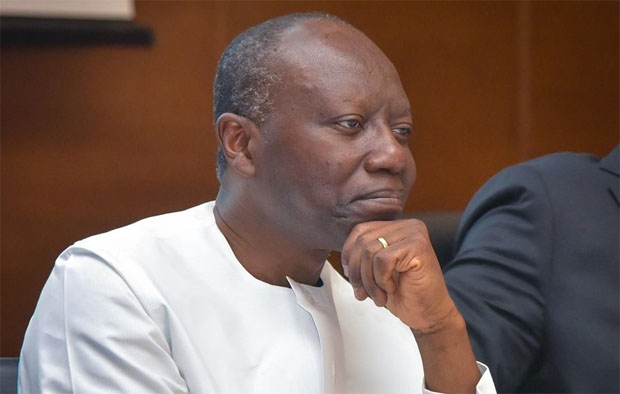Minister of Finance, Ken Ofori-Atta
President Akufo-Addo has tasked the Minister of Finance Ken Ofori-Atta to investigate the structural causes of the depreciation of the cedi against major foreign currencies and make recommendations to combat them.
The minister, who disclosed this to Parliament yesterday in Accra, disclosed this while speaking on Ghana’s successful completion of the Extended Credit Facility (ECF) of the International Monetary Fund (IMF).
Mr. Ofori-Atta said he would work with the Central Bank Governor to “put a bipartisan committee together to proceed immediately.”
On 2nd January, the cedi sold at GH¢4.83 to a dollar, losing value to end January at GH¢4.95.
The cedi reached GH¢5 to a dollar on February 9 and by end of February, it sold at GH¢5.16 to a dollar on the interbank foreign exchange market, depreciating further by 8 pesewas to record GH¢5.24 by March 12.
The cedi contained the dollar before picking up to sell at GH¢5.16 on March 22, 2019.
It began to appreciate slightly recently, but the turbulence is still not over, hence the call for investigation.
Recent appreciation
According to Mr. Ofori-Atta, the appreciation of the cedi was not due to weak economic fundamentals, but a combination of structural rigidities and apparent speculative behaviour of portfolio investors and market forces.
“It is also noteworthy that while this is a challenge, the cedi has however performed better over the last two years than when it is compared specifically from 2012 to 2016.
He said in 2012, the cedi depreciated by 15.95 per cent, 12.81 per cent in 2013, peaked at 32.45 per cent in 2014, halved to 15.68 in 2015 and depreciated by 9.65 per cent in 2016.
Cumulative depreciation from 2012 to 2016 was 65.423 percent.
“From December 2017 through the whole of 2018 to March 21, 2019, the cedi had depreciated by 17.325 per cent compared to 30.25 per cent in 2015 and 2016. Mr Speaker, indeed the cedi’s recovery has started even before the Eurobond was issued and if I may add, before the Vice President’s visit to India,” he stated.
Investors’ Confidence
The minister said the success of the Eurobond issuance showed the confidence investors had in Ghana’s economy who over-subscribed it by seven times.
He added that the cedi had made great strides on the back of the successful issue of the $3 billion Eurobond and completion of the 7th and 8th IMF reviews which restored confidence in the economy.
Considerable Gains
Mr. Ofori-Atta said currently the cedi had witnessed substantial gains due to the measures government had put in place, adding that based on the existing sound macro-economic fundamentals, the incumbent government anticipates the stability of the cedi going forward.
“The cedi has appreciated by 5.12 per cent in March 2019 alone as against a depreciation of 2.7 per cent in the same period last year. We need to put in structures to strengthen the resilience of the cedi against its major trading currencies.”
He said government must enhance the transparency of the country’s foreign exchange market to minimise information asymmetry and panic buying of currencies by businesses and the public when there are seasonal blips in the currency.
He said government must develop capital markets, insurance and pension industries to ensure that its domestic borrowing relies less on foreign portfolio investors.
Projection
“Mr. Speaker, our current progress on the economy, sustained GDP growth and economic transformation will virtually ensure that the currency is stable over the medium term.
“The Bank of Ghana will remain vigilant in the short term to build adequate reserves buffers and promote market discipline in the forex market. Over the medium term, government will ensure that we have a transformed economy that will strengthen our trade, current and capital accounts.”
He expressed the belief that current efforts by government to boost exports and reduce imports by diversifying and deepening the economy through industrialisation and developing the agri-business, as well as improving financial sector architecture, would help to shore up the cedi.
By Samuel Boadi & Melvin Tarlue


